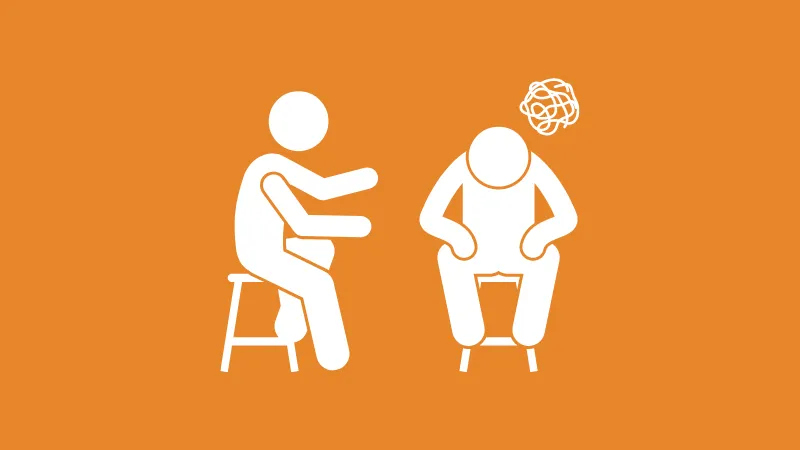Table of Contents
Affiliate link notice: As an affiliate of BetterHelp and other third-party vendors, We will receive compensation if you make a purchase using the links provided on this page. For more information, visit our disclosure page.
Last Updated on March 13, 2023 by Randy Withers, LCMHC
There’s been a lot of talk about toxic masculinity over the past few years. Setting aside the politics associated with that term, let’s talk about it through the lens of mental health.
Social and cultural expectations can pressure men to conform to certain ideals, such as the image of a strong, tough, dispassionate man who asserts his male dominance.
These masculine standards have been linked to increased anxiety, depression, and other psychological issues among men, making it essential to have this conversation. In light of the immense harm done to men’s well-being by toxic masculinity, we figured writing a blog post about it would be helpful.

What is Toxic Masculinity?
Toxic masculinity encompasses many attitudes and behaviors, including bullying, violence, authoritarianism, misogyny, and a lack of empathy. Meanwhile, toxic masculinity has many manifestations beyond observable aggression and stereotyping.
Frequently, it manifests itself in subtle ways that you might not even notice. Toxic masculinity can manifest in various settings, including social encounters, academic institutions, and the workplace. For example, a man with mental health issues may feel that he should “act like a man” rather than seek help from a therapist.
These harmful characterizations can affect a man’s physical and emotional health and may even discourage him from getting medical help when needed. For instance, this could potentially impact individuals who depend on individual health insurance.
Toxic masculinity can keep men from obtaining the medical treatment they need, although many insurance plans cover preventive exams and screenings. As such, males may have to pay more for healthcare and experience more severe health problems in the future.
Effects of Toxic Masculinity on Men’s Mental Health
All too often, toxic masculinity manifests itself in the examples we have mentioned above. These factors increase men’s vulnerability to developing mental health problems that can have far-reaching consequences for their well-being.
The following are some potential effects:
1. Pressure To Conform To Societal Expectations
Truth be told, men do get criticism when they don’t conform to gender stereotypes, such as when they are vulnerable, soft, empathetic, sad, modest, or declare themselves to be feminists.
For instance, a fascinating collection of studies from 2015 found that people regard male leaders as less capable, competent, and confident when they seek assistance. Men are also thought to be of lower status when they expose a weakness at work and make themselves appear helpless. That’s an issue since it leads to less growth and more blunders if you don’t ask for help when you need it or recognize your own weaknesses.
What’s more, studies have shown that males who display grief at work are judged less favorably than women who do the same. According to research published in 2013, men who cry on the job are seen as more sentimental and less capable than women who cry in the workplace.
Furthermore, in contrast to women, males who cry in reaction to performance feedback are rated by the feedback provider as weaker performers, less likely to be promoted, and less capable than women who react the same.
Many additional contexts exist where males are expected to behave a certain way because doing otherwise might harm their image. If they act in a way that is contrary to what is considered “standard” in their society, they may face backlash.
2. Challenges On Relationships
Toxic masculinity has adverse effects on interpersonal relationships, especially romantic ones.
It can get in the way of your intimate connections, ability to share your feelings with your partner, and even your capacity to feel those emotions. For example, showing vulnerability in a romantic relationship is essential for developing trust, ensuring security, and experiencing a deep connection on different levels.
Couples that are able to listen to one another, show empathy for one another, and talk about how they’re feeling are more likely to have a happy relationship. Unfortunately, few of us learn these qualities through our families or the larger society.
As a result, if a man’s feelings are hurt by something, he may find it difficult to express them without appearing across as furious, aggressive, or assertive, which can have serious impacts on their capacity to communicate and form intimate bonds.
3. Coping with the Effects of Toxic Masculinity
Toxic masculinity makes it difficult for men to see their situation clearly, but a competent mental health expert can make a difference. Counseling can help men overcome mental health issues, improve relationships, and make positive life adjustments.
Also, males need to have a network of people they can turn to for emotional and practical assistance, such as friends, family, and peers.
To supplement these, it can be highly beneficial for men to discover a stress-relieving hobby or pastime that provides a new focus when things feel too much. It could be learning a new skill, working out, reading, producing music, or cooking. When you feel emotionally weighed down, you can turn to these activities without risking your physical well-being.
4. Negative Impact On Emotional Expression
Men in the United States are more prone to take their own lives than women because they are less open about their emotions or admit vulnerability.
Men’s mental health suffers when they repress their feelings, disregard their emotions, or reject their more feminine qualities. Following societal norms that tell men to “tough it out” and refuse help from others can exacerbate mental health problems, promote estrangement from friends and family, and result in poor coping abilities when dealing with stress or difficult emotions.
To address these issues, it’s crucial to instill in boys and young men of all backgrounds the notion that it’s normal to show their feelings. Boys and men must learn to recognize and communicate their emotions, which must transpire in classrooms and at home.
Taking a compassionate, non-judgmental approach can help people overcome their fears and concerns about therapy and mental well-being.
Final Thoughts
Many men were raised with the concept that they should be tough and fearless, and they often feel compelled to conform to society’s standards of “manliness.” B
ut as we learn and discuss more about toxic masculinity and its negative consequences on society, men are starting to resist these traditional views on masculinity and strive to value their overall state of mind.









